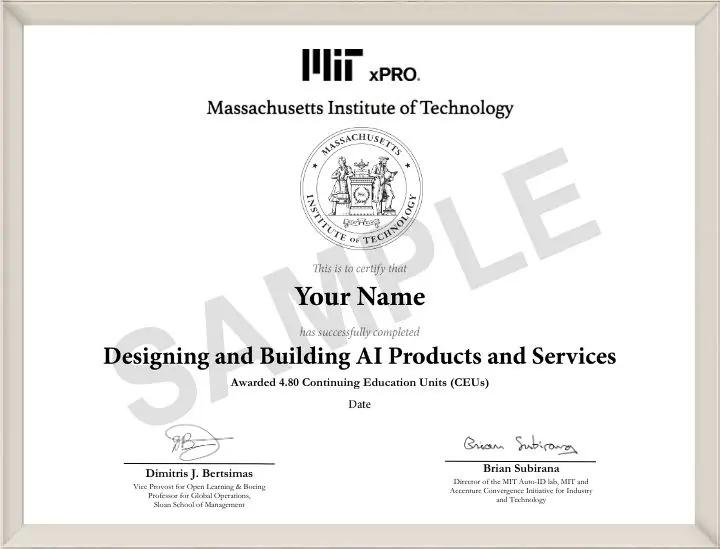Designing and Building AI Products and Services
Uncover potential applications of AI for growth
Introduction to AI-Based Product Design
If you are a professional or an entrepreneur working in the field of artificial intelligence (AI), this program will help you understand technology and business design principles and applications of AI across various industries and organizational functions. The goal is for you to create an AI-based product proposal, which can be presented to your internal stakeholders or investors. You will learn the various stages involved in the design of AI-based products, and the fundamentals of machine and deep learning algorithms, and apply the insights to solve practical problems. You will also be exposed to the latest industry trends in Agents and Retrieval-Augmented Generation (RAG) in a live session with program faculty Dr. Brian Subirana, gaining perspective on the latest directions of AI product design.
Who Is This Program For?
This 8-week course is ideal for you if you are a technical product leader, technology professional, technology consultant, or entrepreneur who wants to enhance your understanding of AI technology fundamentals and tools, and explore various design processes involved in AI-based products. Knowledge of calculus, linear algebra, statistics, and probabilities is beneficial, along with basic Python experience. The program is ideal for:
Technical Product Managers & Leaders in charge of machine learning and AI-based products in their organizations who are looking to add value to their organization by leveraging the latest in AI technologies.
Technology Professionals who design and develop technology solutions aligned to organizations’ needs and are looking to broaden their understanding of developing AI-based solutions using machine learning algorithms.
Technology Consultants who focus on the analysis, design, and development of technology solutions for clients.
Founders of AI Startups that build AI-driven applications and want to learn a proven framework for developing viable AI products and network with other technologists.
UI/UX Designers & Leaders responsible for managing user experience of AI-based applications.
Note: The content of this program assumes previous knowledge of calculus, linear algebra, statistics, and probability. Basic Python experience will also be beneficial.
Testimonials
Representative Companies
Jaguar Land Rover Italia s.p.a.
Apple
Microsoft
Ecoplexus
Accenture
Zebra Multimedia
MSC CRUISES
Key Takeaways
This program is designed to equip you with the skills to broaden your understanding of AI-based solutions and Gen AI.
The program will help you to:
Categorize Different Machine Learning Algorithms:
Classify and describe various machine-learning algorithms, such as supervised, unsupervised, and reinforcement learning, highlighting their unique characteristics and applications.
Categorize Different Convolutional/Deep/Recurrent Neural Network Algorithms:
Distinguish between different types of neural networks, including convolutional neural networks (CNNs), deep neural networks (DNNs), and recurrent neural networks (RNNs), explaining their structures, functionalities, and use cases.
Categorize Generative AI technologies:
Understand the architectures underlying transformer and other generative AI approaches to be able to critically assess when to use them in a given business context.
Evaluate the Four Stages of the AI Design Process Model:
Critically assess the four key stages of the AI design process, discussing their significance, challenges, and best practices for successful implementation.
Explain How Humans and Computers Interact in AI:
Analyze the interaction between humans and computers in AI systems, focusing on how human input, oversight, and collaboration enhance AI performance and decision-making.
Describe How Different Types of Superminds Address Various Problems:
Illustrate the concept of superminds—groups of individuals and machines working together—and how different configurations of superminds can effectively tackle diverse problems.
Predict AI Opportunities in Digital Business Processes:
Identify and forecast potential AI-driven opportunities within digital business processes, emphasizing areas where AI can drive innovation, efficiency, and competitive advantage.
Build a Business Case for Initiating an AI Application:
Develop a comprehensive business case for the initiation of an AI application, including cost-benefit analysis, strategic alignment, risk assessment, and an implementation roadmap.
Program Highlights
Earn a certificate and 4.80 Continuing Education Units (CEUs) from MIT xPRO
Insights from faculty on RAG, Agentic AI, and future AI trends in a live session
Market-ready skills for evaluating the opportunity for AI solutions and making the case for it
Develop an AI project proposal to present to internal stakeholders or investors
Advance your knowledge through crowdsourcing, demos, and design-support activities
Program Topics
Live Session
Agentic AI, RAG, and the Future of Scalable AI
In this live session, Dr. Brian Subirana explores AI agents including, Retrieval-Augmented Generation (RAG) techniques, the Model Context Protocol (MCP), and the future of scalable AI design. Using real-world examples, including Open Source LLMs, LangChain and Amazon case studies, the session covers technical best practices, business deployment challenges, and emerging trends shaping intelligent AI systems.
Note: Live sessions are subject to change. Agentic AI and RAG are addressed through the faculty-led session and complement the core module instruction.
Faculty

Former Director, MIT Auto-ID lab
Brian Subirana has taught at MIT Sloan and the MIT School of Engineering and he is also on the faculty of Harvard University. His research centers on IoT and AI, and focuses o...

Senior Research Scientist, MIT; Associate Director, MIT Media Lab
Andrew Lippman heads the Viral Communications research group at MIT Media Lab. His work has ranged from digital video and entertainment to graphical interfaces, networking and...

X-Career Development Assistant Professor, MIT Electrical Engineering and Computer Science, joint with Mechanical Engineering
Stefanie Mueller is the head of the Human Computer Interaction Communities of Research (HCI CoR) at MIT CSAIL. In her research, she develops novel hardware and software system...

Clarence J. Lebel Professor, Electrical Engineering and Computer Science
Duane Boning is affiliated with the MIT Microsystems Technology Laboratories and serves as Associate Director for Computation and CAD (computer-aided design). He is also the E...

Managing Director, MIT Machine Intelligence for Manufacturing and Operations (MIMO)
Bruce Lawler is a technology entrepreneur and an executive leader. He has developed several applications across platforms such as mobile, SaaS, AI and video distribution netwo...

Patrick J. McGovern Professor of Management, MIT Sloan Founding Director, MIT Center for Collective Intelligence
Thomas W. Malone is the Professor of Information Technology and a Professor of Work and Organizational Studies at MIT. In his researches over the years, Malone rightly predict...
Guest Speakers

Chief Executive Officer, Voomer
David Anderton-Yang heads the startup Voomer, which helps users build confidence in video interviews. The service uses an AI-enhanced video analysis technique to give users fe...

Research Assistant, MIT Media Lab
Aruna Sankaranarayanan works at the Viral Communications group at the MIT Media Lab. Her research looks at the ways in which deep learning and computer vision techniques can m...

Certificate
Get recognized! Upon successful completion of this program, MIT xPRO grants a certificate of completion to participants and 4.80 Continuing Education Units (CEUs). This program is graded as a pass or fail; participants must receive 75% to pass and obtain the certificate of completion.
Note: After successful completion of program, your verified digital certificate will be emailed, at no additional cost, in the name you used when registering for the program. All certificate images are for illustrative purposes only and may be subject to change at the discretion of MIT.
AI Strategy and Product Innovation
Registration for this program is done through Emeritus. You can contact us at learner.success@emeritus.org
FAQs
Financing Options
Climb Credit*
We offer financing options with our partner, Climb Credit*. Click here to learn more.
Flexible Payment Options For All
Flexible payment options allow you to pay the program fee in installments. Click here to see payment schedule.
Didn't find what you were looking for? Write to us at learner.success@emeritus.org or Schedule a call with one of our Academic Advisors or call us at +1 401 443 9591 (US) / + 44 189 236 2347 (UK) / +65 3129 7174 (SG)
Early Registrations Are Encouraged. Seats Fill Up Quickly!
Flexible payment options available.
Starts On




